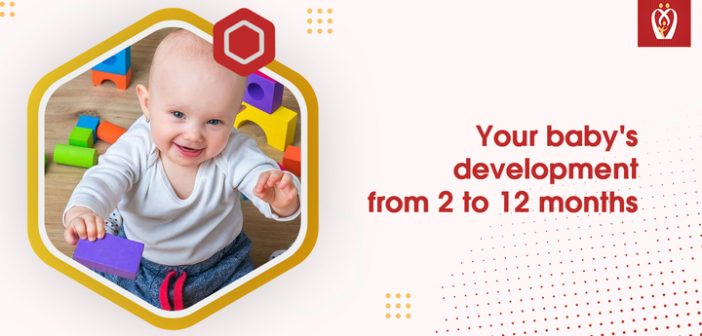Baby development- Now that your baby is a year old, there are plenty of reasons to celebrate! If they haven’t already, they are getting ready to take those crucial initial steps toward feeding and expressing themselves. Despite the fact that they are still babies, they are gaining knowledge about the world around them on a daily basis.
Two months
You should expect your infant to have made the connection between their hands and fingers around this time (2 months). They’ll grab something with their hands open (even if they haven’t learned how to let go yet!). As an alternative, they may hold their hands together in a fist.
The coordination of 2-month-old newborns’ movements will begin to develop. Moving in circular motions instead of the jerky arm and leg movements they used to make as babies are easier for them to do now. They’ll wriggle about and kick hard with both legs. Never leave them alone on a changing table because they might rollover.
Their neck is going to develop stronger and stronger as they go along. It’s possible they’re moving their head from side to side while doing tummy time. By now, some babies are capable of lifting their chests off the ground.
By the time they’re two months old, some newborns (though a very small percentage) are able to sleep through the night on their own. Your baby will be sleeping longer stretches even if you’re not one of the fortunate parents or caregivers. They’ll generally be sleeping for two to four hours at a time, and they’ll be more attentive and awake during the day – but babies’ sleep habits can still vary greatly at this age.
They’ll know you’re talking to them because they’ll look at you and follow your gaze. They’ll be smitten with your features and beam at you with grins. To pique their interest, they should look at things with more intricate patterns and colors.
More sounds and gurgling, such as “a” or “o,” will be coming from them, and they will appear to be paying attention and talking back to you. (baby development)
Five months
Soon, your baby will be able to sit up on its own. When held or pushed up in a sitting position, babies’ backs tend to straighten. Stay near them and surround them with cushions in case they fall, even if they can sit on their own for a short time. They will arch their backs and extend their limbs and legs when they are on their stomachs. Their heads and shoulders will be able to rise when they are on their backs. Their favorite pastime will be bouncing about on top of your lap, and they’ll be able to easily roll from their belly to back and back.
Even now, they can effortlessly bring an object into their mouths since they’ve mastered the art of chewing on things. Even if they can handle a bottle on their own, it’s preferable if you feed them. At 5 months, they’ll likely be interested in eating solids, but breast milk or formula should remain their primary source of nutrition. (baby development)
Your baby is acquiring a wide range of language skills at this time. They may do the same thing, like blowing raspberries, over and over again. This is quite normal. They are also able to identify various noises and their origins. While you’re out shopping with your infant and they start to whine, try jangling a set of keys to keep their attention occupied.
Nine months | baby development
When your kid is 9 months old, he or she will be able to comprehend the meaning of words. Pointing at anything could pique their interest. To grab your attention, they’ll be rambling, mimicking sounds, and creating noises, and they may stop when you say no. It’s likely they’ve heard of them by now.
Many 9-month-old babies are able to climb stairs, but it can be difficult to get them back down. After standing, they will also be taught how to bend their knees so that they can sit down. Babies around 9 months of age should be able to sit up without falling over. (baby development)
Many 9-month-olds enjoy playing “passing games,” in which they give you a toy and then take it back. Stacking rings, levers, doors, and moving pieces will also pique their interest, as will placing things in a container and pulling them out again.
One year
‘Mama’ and ‘Dada’ are likely the only words in your baby’s vocabulary. Their chattering will resemble a conversation in its naturalness. When you name a portion of their body, they’ll be able to show you where it is.
They may be able to get up on their hands and knees and use the furniture as a means of transportation (known as “cruising”). Some infants are now able to stand unassisted and even take their first steps.
By the time your baby is 12 months old, they will be able to use their hands and fingers proficiently. They’ll try to eat by holding a spoon in their hands. Drinking from a cup is preferable to drinking from a bottle for your infant, therefore encourage your child to do so. A bottle should be phased out by the time a child is 18 months old. (baby development)
Using the Nurturey PinkBook is an excellent way to keep track of your child’s milestones and progress. To help users better understand their milestones, the app presents a variety of resources. Try it out and find it yourself!







